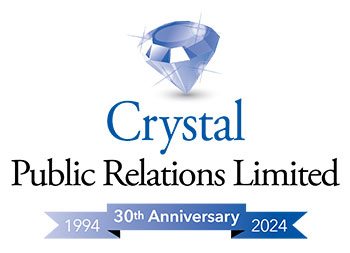With Crystal PR marking its 30th anniversary this year, Managing Director Mike Sunier reflects on what a career in PR involves today, why people are often unsure what to expect when embarking on a career in PR, and where the industry is headed…
For those considering a PR career, there’s often uncertainty about whether it’s right for them; a sense you are not quite sure what it involves.
That’s generally not so if you apply to be a journalist, a lawyer, an estate agent or a banker, for instance, where most know what the work involves and what the purpose is. But with PR it’s not easy to categorise and therefore to know the skills required.
Is the focus mainly on contact with journalists? Where does marketing and design fit in the mix? Or is it only about strong inter-personal skills? How important is writing press releases, building influential contacts, presenting well at meetings and having a rounded knowledge of the local business environment?
Well, it’s probably true to say it’s none of the above on their own but a sprinkling of all of the above when combined.
These days the greatest emphasis is on strong writing capabilities embracing many styles and tones of voice but the day-to-day work of a public relations consultant is not easy to define because advising on the reputation of an organisation draws in many disciplines.
As a consultant you may well write a press release that you expect will generate editorial coverage for your client but you might also assess the media landscape for advertising and partnership opportunities.
In similar fashion to a marketeer, you need to understand the people your client is seeking to reach and which avenues will most likely reach them and you may well be asked to write engaging content which is not always destined for the media.
Sometimes it will be based on technical content and at other times copy will be more user friendly.
Usually, a skill you won’t need is the ability to produce designs, though you will be asked your opinion from time to time on design solutions and whether they might impact the reputation or the brand.
And then there is always likely to be an incident or development that requires sensitive handling with the media.
The thing about PR is that you never know what might arise because it’s all about reputation and so much can impact on reputation at a firm or organisation.
So, on any working day, you might be responding to a question from a journalist and helping the client respond effectively, researching media titles to find feature and
interview opportunities or recommending a press release is written in response to a client’s actions. Some agencies also manage events directly or if not, you might asked to attend if media have been invited or you might be required to write content based on the presentations at the event.
At some agencies including ours, the job will most certainly involve writing hundreds, sometimes thousands of words of content during any given month and all the while you will keep close to the expanding digital landscape and tracking industry trends, both so your knowledge increases and so you can flag relevant developments to your clients.
Meanwhile, there are qualifications available to practitioners up to Chartered status through professional bodies that represent the public relations industry, so plenty of career progression is possible.
Still interested? Then it’s time to approach an agency about vacancies.

